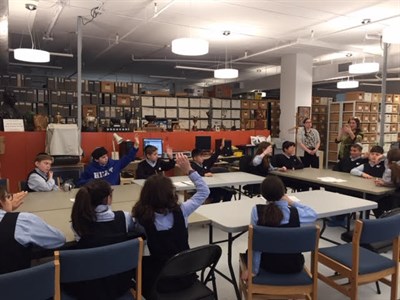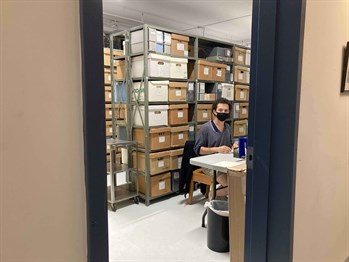Amid March 2021 announcements of the
one-year anniversary of the present global pandemic, we have
suddenly realized that we are tardy in posting our year-end
Archives report. 2020 started off with days when numerous people
were gathered in the Archives work area - for classes, for
research, and as student interns - and ended with many, many days
of experiencing working onsite alone. However, we rarely lacked for
contact with our researchers; through email, scheduled phone
conversations and, of course, Zoom.
We answered 462 remote research requests in 2020, and despite
recurrent lockdowns were able to receive 86 researchers onsite
during the periods when we were open to the public. Being located
in a spacious and quiet building we were able to continue to make
regular visits to monitor conditions and could access the
collections in order to carry out research and scanning tasks for
researchers who were otherwise prevented from working with original
archival documents.

Prior to the pandemic we hosted two large classes onsite in our
premises in January, including for the first time a group of Grade
6 students from Hebrew Academy Elementary School, who came to learn
about Jewish immigration to Canada and how to trace their family
history.
As the year progressed, we pivoted from our regular hosting of
history student groups from local universities in order to
introduce them to using archival resources, instead hosting two of
these classes on Zoom. In this way for the first time we were able
to reach a class located in another city, as we presented to a
history course titled "Worry & Wonder: Jewish Politics,
Religion and Culture in Canada" at York University in Toronto. The
discussion was focused on resources available in digital
format.
We were assisted at various points during the year and
were able to offer training to 7 student interns; 4 from history
classes at Concordia and McGill and 3 from archival studies
programs - McGill University, John Abbott College, and College
Maisonneuve. Our student interns helped catalogue collections and
produced 4 historically-themed videos which have been uploaded to
our Canadian Jewish Heritage Network channel on Youtube. (https://youtu.be/sxQDAPN4wRw, https://youtu.be/p2LC53h40_4, https://youtu.be/748BN4TG76A, and https://youtu.be/VFyK4ycvses.)

We increased our social media presence, with a new Facebook
initiative called "The Canadian Jewish Time Machine". Started in
mid-April 2020, over the course of the year we posted 124
illustrated Fact of The Day vignettes, attracting many new
followers to our page at https://www.facebook.com/CanadianJewishArchives/.
In June 2020 we were happy to see and speak with our colleagues
across Canada during the first virtual "Jewish Archives and Museums
Cross Country Check-in", which was held via Zoom. Among the 9
Jewish heritage curators who participated were several of our
partners from the Canadian Jewish Heritage Network (http://cjhn.ca).
For Federation CJA's first virtual Remembrance Day ceremony on
Nov 11, 2020 we created a Powerpoint dedicated to the memory of the
578 Canadian Jewish military casualties in the Canadian Armed
Forces.
Despite the restrictions on interactions we managed to acquire a
dozen new collections over the course of the year, including rare
19th century photographs of members of the earliest Quebec Jewish
families donated by the estate of Anne Joseph, fascinating
documents tracing a Jewish family's immigration from Latvia to
Quebec City in the early 1900s from Shawn Rosengarten, and a wealth
of informative interviews done with Montreal Jews of Iraqi descent
from Dr. Norma Joseph.
Furthermore, we were pleased and honoured to receive monetary
donations of between $120 and $5000 from three grateful users of
the Archives. These contributions will be used to finance special
technical equipment purchases and indexing initiatives which will
help us move the Archives' operations in new directions in
2021.